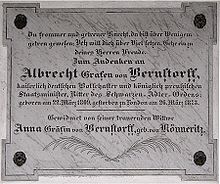- Albrecht von Bernstorff
-
Not to be confused with Albrecht von Bernstorff (1890-1945).
Albrecht Graf von Bernstorff (22 March 1809 – 26 March 1873) was a Prussian statesman.
Bernstorff was born at the estate Dreilützow (now in the municipality of Wittendörp), in the Duchy of Mecklenburg-Schwerin. He studied legal science in Göttingen and Berlin, following which he joined the Prussian civil service.
Diplomat
In 1832 he became an attaché with the Prussian legation in Hamburg. A year later he was made legation secretary in Den Haag. In 1837 he was transferred to St. Petersburg and made legation councillor. Due to the death of his father he returned to Germany that same year to settle family matters. After this, in 1838 he changed to Paris, where in 1839 he married Anna von Könneritz (born 23 May 1821 in Dresden), the daughter of the Saxonian ambassador at the French court, Hans Heinrich von Könneritz (1790–1863). In 1840 Bernstorff became chargé d'affaires in Naples, and in 1841 in Paris.
Subsequently, from 1842 he was an Expert Councillor (Vortragender Rat) in the political section of the foreign ministry. As such, he occasionally had to represent the foreign minister. In 1843 he was promoted (to Geheimer Legationsrat). In 1845, he went to Munich as Envoy Extraordinary and Minister Plenipotentiary.
Following much travels as a career diplomat, Bernstorff was sent to Vienna as an envoy in May 1848 during the revolution, remaining there until 1851. He soon distinguished himself as an opponent of German unification schemes. (He later came to accept such unification, though he felt it should be under Prussian rather than Austrian leadership.) During the revolution of 1848/49 he argued for a strong alliance between Prussia and Austria. However, differences between the two states came more to the fore under Austrian prime minister Prince Felix zu Schwarzenberg, and due to Bernstorff's opposition to the Prince's German policy, he was recalled from his post at the express wishes of the Austrian side in 1851.
In 1851-1852, Bernstorff was a member of the first chamber of the Prussian Parliament (Landtag), the Prussian House of Lords, in the Alvensleben faction. With the title of wirklicher geheimer Rat, he was sent to Naples in 1852 as an envoy.
Shortly before the outbreak of the Crimean War in 1854, he was sent as head of the Prussian embassy in London, and was successful in promoting good Anglo-Prussian relations.[1] His son, Johann-Heinrich, Count von Bernstorff, was born in London in 1862.
Foreign minister
In October 1861, Bernstorff left London to become the Prussian Foreign Minister under the Prime Minister Charles Anthony, Prince of Hohenzollern. (He had previously been offered the position of Foreign Minister in 1848 and 1850 by King Frederick William IV, without taking it up.) He thus replaced a rather passive Count Alexander von Schleinitz (an Old Liberal) and, in the Cabinet, reinforced the more conservative grouping around August von der Heydt and Albrecht von Roon.
He would introduce several new policies and strategies. During this period, ideas were being discussed for the reform of the German Confederation. Bernstorff revived a project from 1849 to form a narrow Prusso-German Bundestaat in order to ward off such initiatives by Austria, and argued for a "Lesser German" union under Prussian leadership and excluding Austria; these plans were not pursued for the time being, however, as they were undermined by mistrust of political elements.
Bernstorff also negotiated military conventions with various northern German states, concluded a free-trade agreement with France as part of changes to the Zollverein policy to isolate protectionist Austria, and swiftly recognized the new Kingdom of Italy as a state in hopes that it would help collaborate against Austria.[2] This last move meant a clear rejection of a Zollunion with Austria.
At the beginning of the Prussian constitutional crisis of 1859-1866, Wilhelm I and his government faced the choice of continuing to govern, without a constitutional budget. Von der Heydt, Bernstorff and the minister for trade, Heinrich Wilhelm von Holtzbrinck, rejected this as a violation of the constitution, and resigned. Other ministers were prepared to continue in office. In this situation, the minister for war, von Roon, pushed through the appointment of Otto von Bismarck both as foreign minister and prime minister. Thus, in 1862 Bernstorff was replaced in his post; he would thereafter criticize Bismarck as having Machiavellian policies.
He was later reassigned to his position as Prussian ambassador in London, and after 1871 as German Imperial ambassador with the rank of minister of state, which he remained until his death in 1873.[1] During this time, he also served as the Prussian delegate at the London Peace Conference of 1864, which led to the signing of the Treaty of Vienna. In 1867, he was also the ambassador of the North German Confederation at the negotiations for the Treaty of London, which determined the status of Luxembourg.
He is buried (according to the inscription on his tombstone) in the Bernstorff family mausoleum in the churchyard at Lassahn, Mecklenburg-Vorpommern.
Notes
- ^ a b "Bernstorff, Albrecht, Count von." Encyclopædia Britannica. 2006.
- ^ Hayes, Bascom Barry (1994). Bismarck and Mitteleuropa. Fairleigh Dickinson University Press. p. 85. ISBN 0-8386-3512-1.
Regarding personal names: Graf is a title, translated as Count, not a first or middle name. The female form is Gräfin.
Hertzberg · Goltz · Hardenberg · Bernstorff · Ancillon · Werther · Maltzan · H. Bülow · Canitz und Dallwitz · Arnim-Boitzenburg · Arnim · Schleinitz · Auerswald · Dönhoff · Brandenburg · Eichmann · Arnim-Heinrichsdorff-Werbelow · Brandenburg · Schleinitz · Radowitz · Manteuffel · Schleinitz · Bernstorff · Bismarck · Caprivi · Bieberstein · B. Bülow · Bethmann Hollweg · Michaelis · Hertling · Baden Categories:
Categories:- 1809 births
- 1873 deaths
- German diplomats
- German nobility
- People from Mecklenburg-Schwerin
- Prussian diplomats
- Prussian politicians
Wikimedia Foundation. 2010.

